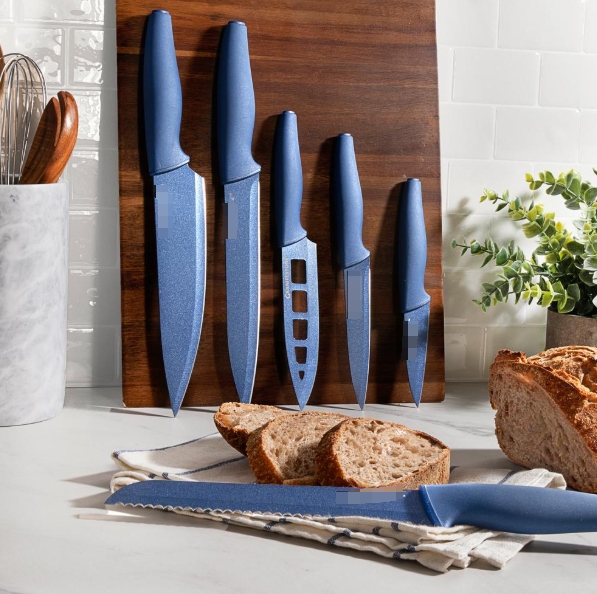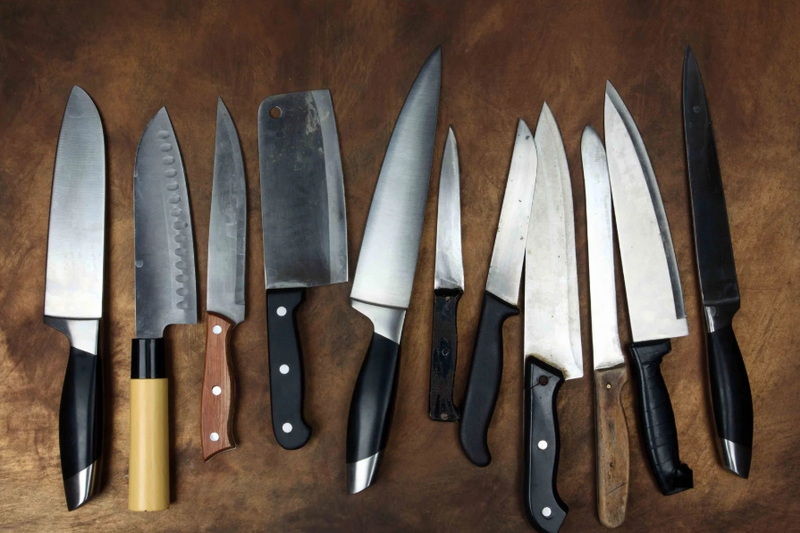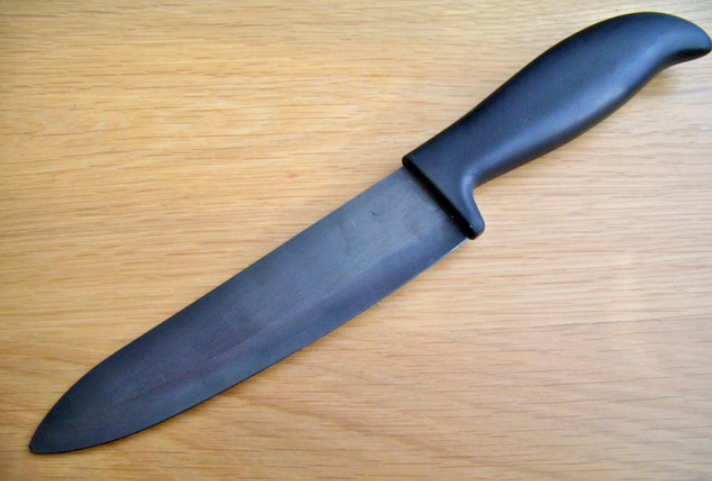

Views: 222 Author: Ella Publish Time: 2025-05-09 Origin: Site








Content Menu
● Introduction to German Kitchen Knives
● The Legacy of Solingen: Germany's Knife-Making Capital
● Top 10 Kitchen Knife Manufacturers in Germany
>> Wüsthof
>> Güde
>> Böker
>> Robert Herder (Windmühlenmesser)
>> WMF
>> Nesmuk
>> Friedr. Dick
>> Burgvogel
● What Makes German Kitchen Knives Unique?
● Choosing the Right German Knife for Your Kitchen
● German Knife Craftsmanship: Tradition Meets Innovation
● The Role of German Knives in Professional Kitchens
● German Knife Innovation: Sustainability and Modern Materials
● FAQ
>> 1. What is the difference between German and Japanese kitchen knives?
>> 2. Are all German kitchen knives made in Solingen?
>> 3. How should I care for my German kitchen knives?
>> 4. Which German knife brand is best for beginners?
>> 5. What types of kitchen knives do German manufacturers produce?
Germany has long been recognized as a global leader in the production of high-quality kitchen knives. The country's rich heritage of metalworking, combined with a relentless pursuit of innovation and perfection, has resulted in a diverse range of kitchen knives that are revered by chefs and home cooks alike. German kitchen knives are celebrated for their robust construction, ergonomic design, and exceptional cutting performance, making them a staple in both professional and domestic kitchens around the world.
German knives are typically forged from high-carbon stainless steel, which provides a perfect balance between hardness and flexibility. This ensures that the blades maintain their sharpness over time while remaining resistant to corrosion and chipping. The design philosophy behind German knives emphasizes versatility and durability, with many models featuring a full tang and a pronounced bolster for added balance and safety during use.

Solingen, often referred to as the “City of Blades,” is the epicenter of Germany's knife-making industry. With a history spanning several centuries, Solingen has earned a reputation for producing some of the world's finest cutlery. The city's artisans have perfected the art of knife-making, blending traditional techniques with modern technology to create blades that are both beautiful and functional.
The “Solingen” designation is more than just a mark of origin; it is a guarantee of quality. Strict regulations govern which manufacturers can use the Solingen name, ensuring that only knives meeting the highest standards of craftsmanship and performance bear this prestigious label. Many of Germany's top knife brands are headquartered in Solingen, drawing on the city's rich heritage to produce knives that are trusted by chefs and cooking enthusiasts worldwide.
Wüsthof stands as a pillar of German knife-making excellence. Founded in 1814 and still family-owned, Wüsthof has built its reputation on precision forging and meticulous attention to detail. Each knife is crafted from a single piece of high-carbon stainless steel, ensuring optimal strength and balance. The brand's Classic, Ikon, and Gourmet series are beloved for their sharpness, durability, and ergonomic handles.
Wüsthof's knives are distinguished by their laser-tested cutting edges, which guarantee consistent sharpness and performance. The company offers a wide range of blade shapes and sizes, catering to every culinary need from slicing and dicing to intricate garnishing. Wüsthof's commitment to quality is evident in every knife, making it a favorite among both professional chefs and home cooks.
Zwilling J.A. Henckels is a true icon in the world of cutlery. Established in 1731, the brand has a storied history of innovation and excellence. Zwilling's knives are renowned for their FRIODUR ice-hardening process, which enhances the steel's durability and edge retention. The company offers an extensive selection of knives, including both traditional German designs and Asian-inspired blades.
Zwilling's Pro, Four Star, and Twin series are among the most popular choices for chefs seeking reliability and performance. The brand's collaborations with renowned chefs and designers have resulted in unique, high-performance knives that cater to a wide range of culinary preferences. Zwilling's commitment to quality and innovation has made it a household name in kitchens around the globe.
Messermeister, meaning “knife master,” is a family-owned company that has quickly risen to prominence in the world of German cutlery. Founded in 1981, Messermeister combines traditional hot-drop forging techniques with modern materials to create knives that are both beautiful and functional. The Meridian Elite and Oliva Elite series are particularly popular among professional chefs for their balance, sharpness, and comfortable handles.
Messermeister's dedication to craftsmanship is evident in every knife they produce. The company uses only the finest materials, including high-carbon stainless steel and premium woods, to ensure that each knife meets the highest standards of quality. Messermeister's knives are designed to withstand the rigors of daily use while maintaining their edge and appearance over time.
Güde has been producing handcrafted knives in Solingen since 1910. The company's meticulous 55-step production process ensures that each knife is a work of art, combining traditional craftsmanship with modern technology. Güde's knives are known for their heft, balance, and exceptional sharpness, making them a favorite among discerning chefs.
Güde's Alpha and Delta series feature unique handle materials such as olive wood and micarta, adding a touch of elegance to their robust construction. The brand's commitment to quality is reflected in every detail, from the precision-forged blades to the hand-finished edges. Güde's knives are designed to provide a lifetime of reliable performance in the kitchen.
Böker's roots can be traced back to the 17th century, making it one of the oldest knife manufacturers in Germany. The company is known for its innovative use of materials, including Damascus steel and high-tech ceramics. Böker's kitchen knives are celebrated for their sharpness, durability, and striking aesthetics.
Böker offers a wide range of knives to suit every culinary need, from classic chef's knives to specialized utility blades. The brand's commitment to quality and innovation has earned it a loyal following among chefs and collectors alike. Böker's knives are designed to deliver exceptional performance while adding a touch of elegance to any kitchen.
Robert Herder, also known as Windmühlenmesser, has been crafting knives in Solingen since 1872. The brand is renowned for its hand-ground blades and distinctive “Solingen thin grind,” which results in an exceptionally sharp, lightweight knife. Windmühlenmesser's knives are favored by chefs who appreciate the precision and finesse that only a hand-crafted blade can provide.
The company's use of traditional wooden handles, often made from plum or cherry wood, adds a touch of rustic charm to their knives. Robert Herder's commitment to artisanal, small-batch production ensures that each knife is a unique work of art, designed to provide years of reliable service in the kitchen.
WMF is a household name in Germany, known for its high-quality kitchenware and cutlery. The company offers a wide range of kitchen knives designed for both home cooks and professionals. WMF's knives are celebrated for their ergonomic design, modern aesthetics, and affordability.
WMF's Grand Gourmet and Spitzenklasse Plus series are among the most popular choices for those seeking reliable, stylish knives at an accessible price point. The brand's commitment to quality and innovation has made it a trusted name in kitchens across Germany and beyond.
Nesmuk is a modern luxury knife brand that combines traditional craftsmanship with cutting-edge materials and design. The company's knives are often considered collector's items, featuring exclusive steels like Damascus and unique handle materials such as bog oak and mammoth ivory.
Nesmuk's knives are distinguished by their ultra-sharp, hand-finished edges and artisanal production methods. The brand's focus on exclusivity and craftsmanship has earned it a reputation as one of the most prestigious knife manufacturers in Germany. Nesmuk's knives are designed for those who demand the very best in performance and aesthetics.
Friedr. Dick is one of the oldest knife manufacturers in Germany, with a history dating back to 1778. The brand is particularly popular among professional chefs and butchers, offering a comprehensive range of kitchen and specialty knives. Friedr. Dick's knives are known for their ergonomic handles, high-quality steel, and excellent edge retention.
The company's Premier Plus and Red Spirit series are among the most popular choices for those seeking reliable, high-performance knives. Friedr. Dick's commitment to quality and innovation has made it a trusted name in professional kitchens around the world.
Burgvogel is a family-owned company based in Solingen, producing high-quality kitchen knives for over 70 years. The brand is known for its attention to detail, traditional forging methods, and use of premium materials. Burgvogel's knives are celebrated for their balance, sharpness, and elegant design.
The Oliva Line and Natura Line series are particularly popular among those who appreciate the combination of traditional craftsmanship and modern aesthetics. Burgvogel's commitment to quality ensures that each knife is designed to provide a lifetime of reliable performance in the kitchen.

German kitchen knives are distinguished by several key features that set them apart from knives produced in other regions:
- Blade Construction: Most German knives are precision-forged from high-carbon stainless steel, offering a perfect balance of hardness, flexibility, and corrosion resistance. This ensures that the blades maintain their sharpness over time while remaining easy to maintain.
- Design Philosophy: German knives typically feature a curved blade and a pronounced bolster, making them ideal for a rocking chopping motion. This design provides greater control and safety, especially when performing repetitive cutting tasks.
- Durability and Versatility: German knives are built to withstand heavy use, making them a favorite in both home and professional kitchens. Their robust construction and versatile blade shapes make them suitable for a wide range of culinary tasks.
- Ergonomic Handles: Many German knives feature ergonomically designed handles made from a variety of materials, including synthetic composites and natural woods. This ensures a comfortable grip and reduces fatigue during extended use.
- Comprehensive Range: German manufacturers produce a full spectrum of kitchen knives, from chef's knives and paring knives to specialty blades for tasks like bread slicing and filleting.
Selecting the perfect German kitchen knife involves considering several important factors:
- Intended Use: Determine which types of knives you need based on your cooking habits. A chef's knife is a versatile all-purpose blade, but you may also benefit from specialized knives like bread knives, utility knives, or boning knives.
- Handle Material: Choose between traditional wooden handles for a classic look and feel, or modern synthetic handles for enhanced durability and ease of maintenance.
- Blade Size and Shape: Consider the size and shape of the blade that best suits your cutting style and kitchen space. Larger blades offer more versatility, while smaller blades provide greater precision for detailed tasks.
- Budget: German knives are available at a wide range of price points. Brands like Wüsthof and Zwilling offer options for every budget, from entry-level models to high-end, luxury knives.
- Aesthetics: Many German knives feature beautiful designs and finishes, allowing you to choose a knife that complements your kitchen décor and personal style.
Proper care and maintenance are essential to ensure that your German kitchen knives remain sharp, safe, and beautiful for years to come:
- Hand Washing: Always wash your knives by hand using mild soap and warm water. Avoid placing them in the dishwasher, as the harsh detergents and high temperatures can damage both the blade and handle.
- Drying: Immediately dry your knives after washing to prevent water spots and corrosion. Never leave knives soaking in water or resting in a damp environment.
- Sharpening: Regularly hone your knives with a honing steel to maintain the edge. Periodically, have your knives professionally sharpened to restore their original sharpness.
- Storage: Store your knives in a knife block, on a magnetic strip, or in protective blade guards to prevent damage and ensure safety.
- Cutting Surface: Use wooden or plastic cutting boards to protect the blade. Avoid cutting on hard surfaces like glass, ceramic, or metal, as these can dull or chip the blade.
The artistry behind German knife-making is a blend of time-honored traditions and modern technological advancements. Many German manufacturers still employ skilled artisans who hand-finish each blade, ensuring that every knife meets strict standards of quality and performance. At the same time, these companies embrace cutting-edge technologies such as laser-guided edge testing, precision forging, and advanced heat treatment processes to enhance the durability and sharpness of their knives.
This unique combination of old and new allows German knife manufacturers to produce blades that are both functional and beautiful. Whether you prefer the rustic charm of a hand-ground Windmühlenmesser or the sleek lines of a modern Nesmuk, you can be confident that your German knife is the result of centuries of expertise and innovation.
Professional chefs around the world rely on German kitchen knives for their reliability, versatility, and performance. The robust construction and ergonomic design of German knives make them ideal for the demanding environment of a commercial kitchen. Many culinary schools and institutions recommend German knives as essential tools for aspiring chefs, emphasizing their ease of use, durability, and consistent performance.
German knives are also favored for their ability to handle a wide range of ingredients and cutting techniques. From chopping vegetables and slicing meats to filleting fish and mincing herbs, a well-made German knife can handle it all with ease. This versatility makes German knives a valuable investment for anyone serious about cooking.
In recent years, German knife manufacturers have embraced sustainability and the use of modern materials in their production processes. Many companies now source their steel from environmentally responsible suppliers and use sustainable woods for their handles. Some brands, like Nesmuk, even incorporate recycled materials and innovative composites to create knives that are both eco-friendly and high-performing.
The use of advanced materials such as Damascus steel, high-tech ceramics, and carbon fiber has also expanded the possibilities for German knife design. These materials offer unique benefits in terms of sharpness, durability, and aesthetics, allowing manufacturers to cater to a wide range of preferences and needs.
Germany's kitchen knife manufacturers have set the global standard for quality, innovation, and craftsmanship. Whether you opt for a time-honored brand like Wüsthof or Zwilling, or explore the artisanal offerings of Nesmuk or Robert Herder, investing in a German kitchen knife is a decision that pays dividends in performance and longevity. With proper care, these knives become indispensable tools-trusted companions in the culinary journey.
German kitchen knives are more than just tools; they are a testament to centuries of tradition, skill, and passion. By choosing a German knife, you are not only investing in a high-quality product but also becoming part of a legacy that has shaped the world of cooking for generations. Whether you are a professional chef or a home cook, a German kitchen knife will elevate your culinary experience and inspire you to create delicious meals with confidence and precision.

German knives typically feature a heavier, curved blade with a thick bolster, making them ideal for a rocking chopping motion. Japanese knives are lighter, thinner, and often have a straighter edge, suitable for precise slicing and push-cutting techniques.
While Solingen is the heart of Germany's knife-making industry and home to many top brands, not all German knives are produced there. However, the “Solingen” mark ensures strict quality standards and authentic German craftsmanship.
Hand wash your knives with mild soap and water, dry them immediately, and store them properly. Regular honing and occasional professional sharpening will keep the blades in optimal condition.
Brands like Wüsthof and Zwilling offer a range of entry-level knives that combine quality with affordability, making them excellent choices for beginners. Their knives are durable, easy to maintain, and widely available.
German manufacturers produce a full range of kitchen knives, including chef's knives, paring knives, bread knives, utility knives, boning knives, and specialty blades for tasks like filleting, carving, and slicing.